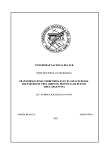Transformaciones territoriales en el espacio rural del partido de Tres Arroyos, provincia de Buenos Aires, Argentina
Fecha
2022Autor
Scavone, Andrea Soledad
Director
Geraldi, Alejandra M.Palabras clave
Geografía; Sudeste bonaerense; Transformaciones territoriales; Espacio ruralMetadatos
Mostrar el registro completo del ítemResumen
Las constantes transformaciones en los territorios rurales desencadenan una serie de
problemáticas en las distintas esferas que constituyen la complejidad del sistema
espacio- sociedad. El área de estudio perteneciente al distrito de Tres Arroyos, no es
ajeno a las problemáticas que se desarrollan en el espacio rural. La falta de planes de
ordenamiento territorial y desarrollo rural, confieren uno de los problemas
principales en este sentido. En las últimas décadas el avance y aumento de bienes y
servicios en los centros urbanos de la presente área, fomentan el desarraigo y la
posible desaparición de poblados de carácter rural.
El área de estudio está conformada por la ciudad principal de Tres Arroyos, las
localidades de Villa Rodríguez (Barrow), Copetonas, Micaela Cascallares, San
Franciscode Bellocq, Lin Calel, San Mayol, Reta, Claromecó y Orense. Representa
un área semiondulada, surcada por el río Quequén Salado, el arroyo Cristiano
Muerto, y los arroyos Orellano, Seco y del Medio. El distrito contempla una
superficie apta para el desarrollo de producciones primarias, especialmente del
sector agrícola por sobre la actividad ganadera.
El objetivo general de la tesis es estudiar las transformaciones territoriales en el
partido de Tres Arroyos para la proyección de escenarios futuros vinculados al
ámbito rural. En este sentido se utilizó como estrategia metodológica la combinación
de enfoques cuantitativos y cualitativos para el abordaje de la misma.
Se demostró que existen pocos cambios a nivel de infraestructura en las localidades
que conforman el distrito a diferencia de la ciudad principal, teniendo un efecto
directo sobrela dinámica del territorio rural. La percepción por parte de los actores
sociales con injerencia en el medio rural sobre el ordenamiento territorial y el
desarrollo rural se centran en las transformaciones acaecidas en la ciudad cabecera del
distrito en detrimientode la totalidad del área de estudio.
Los espacios transicionales de campo y ciudad, manifestaron una deficiencia de
infraestructura y servicios especialmente, en los territorios concernientes a la ciudad
principal.
Los cultivos más representativos del área de estudio, presentan diferencias en
respuesta a diferencias ambientales en los distintos sectores que conforman el
distrito. The constant transformations in rural territories trigger a series of problems in the
different spheres that constitute the complexity of the man-average system. The
study area belonging to the district of Tres Arroyos, is not alien to the problems that
develop inrural areas. The lack of plans for land use planning and rural development
confer one of the main problems in this regard. In the last decades, the advance and
increase of goods and services in the urban centers of the present area, encourage the
uprooting and possibledisappearance of rural towns.
The study area is made up of the main city of Tres Arroyos, the towns of Villa
Rodríguez(Barrow), Copetonas, Micaela Cascallares, San Francisco de Bellocq, Lin
Calel, San Mayol, Reta, Claromecó and Orense. It represents a semi-undulating area,
crossed by theQuequén Salado river, the Cristiano Muerto stream, and the Orellano,
Seco and del Medio streams. The district contemplates an area suitable for the
development of primary productions, especially in the agricultural sector over
livestock activity.
The general objective of the thesis is to study the territorial transformations in the
Tres Arroyos district for the projection of future scenarios linked to the rural
environment. In this sense, the combination of quantitative and qualitative
approaches was used as a methodological strategy to approach it.
It was shown that there are few changes at the infrastructure level in the localities
that make up the district, unlike the main city, having a direct effect on the dynamics
of the rural territory. The perception by the social actors with interference in the
rural environment on land use planning and rural development focuses on the
transformationsthat have occurred in the main city of the district to the detriment of
the entire study area.
The transitional spaces of the countryside and the city, manifested a deficiency of
infrastructure and services, especially in the territories concerning the main city.
The most representative crops in the study area present differences in
response to environmental differences in the different sectors that make up the
district.
Colecciones
- Tesis de postgrado [1479]


